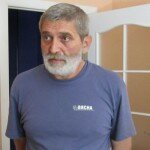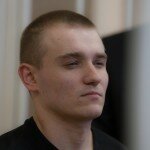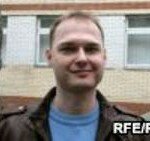
The regime authorities react instantly to any actions organized by members of civil society. The relatives and loved ones of Ihar Ptichkin, who died tragically in custody of the Volodarka prison, were going to meet in front of the prison building. They planned to hold a minute of silence and light the candles but they were immediately detained. The court found them guilty. Without taking into account any legal and moral norms, the police officers detained Ihar’s sister, who is in ninth month of pregnancy. What is going on with Belarusian society? Editors of Palitviazni.info talked with political prisoner, coordinator of “the European Belarus”, Dzmitrij Bandarenka.
Dzmitrij Bandarenka: Every social activity is repressed in Belarus and it has recently become a rule. Now I can observe and compare the situation in Belarus with what is happening in Poland, for example union demonstrations. Thousands of people took to the streets of Polish cities. Warsaw Mayor announced that during the year in the Polish capital there are carried about 700 demonstrations. It’s perfectly normal in a democratic system. Yes, you have to close streets, transportation is sometimes disturbed. But no matter what, about 60% of the population claims to support activities of trade unions. You can easily get an allowance to organize a street action. And that is democracy. Meanwhile the dictatorship makes it impossible to obtain such a permission, and it is even impossible to obtain an allowance to organize a demonstration.
– There is also the violence and cruelty, not only during the dispersal of rallies, but also in prisons, political prisoners are repressed. Why immoral orders are filled with such thoroughness?
Dzmitrij Bandarenka: Please note that in Belarus there is a dictatorship similar to regimes in South America. And the situation may develop in various ways. Dictatorship can fall at any time, and can last for a long time. The regime lasts almost 19-years, during that time was brought up a whole generation of people. Please note that during this time the authorities were selecting people to serve in the militia, the KGB, the prison system. Only the obedient one were given posts. Therefore, the expectation that they will do something different than they do on a daily basis is like expecting the best from the worst. It’s a philosophical question, of a kind asked by our Vasil Bykov and Russian writers, Tolstoy and Dostoevsky – which is the main material of humans and how the divine plan is realized, how it manifests itself. These are the questions of a similar nature. It’s hard to expect anything else now.
– The fact that there are political prisoners in Belarus, that they are treated by the authorities as a “living goods” used to conduct the negotiations with the West, is nothing new. But how can be valued the imprisonment of a citizen of a foreign country like Baumgartner, Uralkalia’s chief or of priest of the Catholic Church, Uladzislaw Lazar? Trading in political prisoners is growing, is it due to the fact that the previous actions of the regime did not produce the expected results?
Dzmitrij Bandarenka: I think that in this situation the dictator exceeds all limits. If the authorities are able to arrest the President of Uralkalia, a citizen of Russia, allied country, they are able to arrest any citizen. Including a priest. However, I would like to be more specific, when they arrested Irina Khalip, the wife of a presidential candidate Andrei Sannikov, and when the authorities began in the prison to exercise psychological pressure on Mr. Sannikov, and when the state has proven that it can at any time take their son to the orphanage – these events marked the moment when the authorities exceeded this inadmissible boundary. And again, in this situation, neither Moscow nor the church in no way responded to these events. Moreover, in my own case, when I was in prison my wife asked the priest to gave me a certificate that I am a member of his parish, he refused, explaining he did not want to interfere in politics. I would also recall a story when the repressions against the Orthodox Church started, as a Catholic I did nothing, when they came for the communists, I also did nothing because I was not one of them. But then they came for me. And in Belarus, where Catholics were tortured in prisons, the Church was silent – so the authorities eventually came for a priest. There was a time when Russia did not respond to tortures of the candidates for president in the KGB prison in Minsk, and now their citizen, a businessman, is in this prison. History repeats itself. If society does not react in time, evil can take the next step.
– Why do we hurt ourselves, and by being able to learn from the mistakes of the past, we do not use this knowledge?
Dzmitrij Bandarenka: Based on my own experience I can say that the most important thing is human solidarity. Both at the institutional level as well as among ordinary people. In prison, I received thousands of letters, as well as other political prisoners. I know that ordinary parishioners pray for me, participating in the campaigns of support. I also see signs of solidarity here in Poland, in relation to my family and friends. This is the most important thing. Our life and our relationship with God. I was happy to see the Protestant church awaiting the release of Dzmitrij Dashkievich. The way in which he was greeted after the release from prison should be an example to the Catholic Church and the Orthodox Church as to how welcome their followers. I saw the wedding of young Nasta and Dzmitrij in the church. It’s a miracle and hope for the future. It was a real Belarusian and Christian marriage. And even if Belarus is governed by dullness, like the rest of the world, the God’s actions are stronger than anything. Belarusians are no exception, and we also need to take our way to freedom. Our country can be free.




